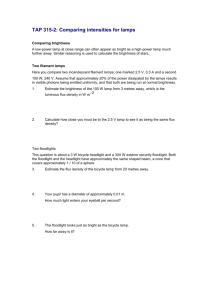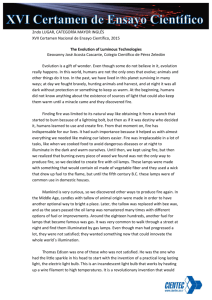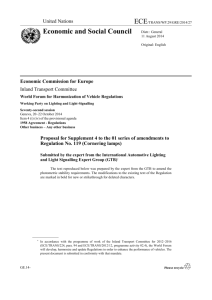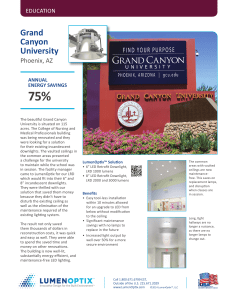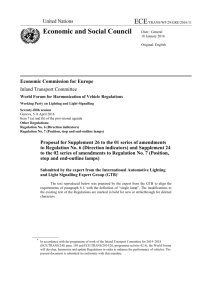Design of Lighting Schemes
advertisement
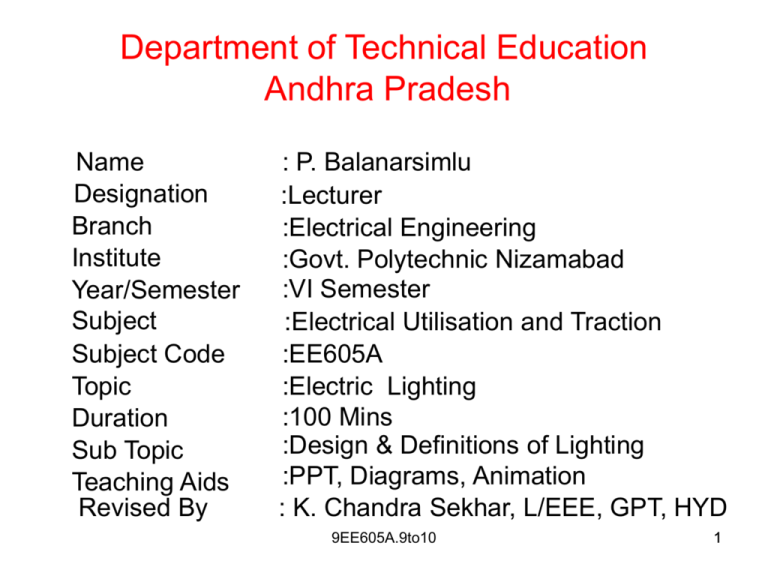
Department of Technical Education Andhra Pradesh Name Designation Branch Institute Year/Semester Subject Subject Code Topic Duration Sub Topic Teaching Aids Revised By : P. Balanarsimlu :Lecturer :Electrical Engineering :Govt. Polytechnic Nizamabad :VI Semester :Electrical Utilisation and Traction :EE605A :Electric Lighting :100 Mins :Design & Definitions of Lighting :PPT, Diagrams, Animation : K. Chandra Sekhar, L/EEE, GPT, HYD 9EE605A.9to10 1 Recap In the last class you have learnt about • Calculation of Illumination using • Inverse Square Law • Lambert’s Cosine Law 9EE605A.9to10 2 Objectives On completion of this topic you would be able to know • Definitions of terms used in design of lighting schemes. • Design of Lighting Scheme for • Drawing Halls • Assembly Hall • Factory 9EE605A.9to10 3 Definitions The following are some of the definitions which we come across in the design of electric lighting scheme. 1. Utilization Factor or Co-efficient of utilization It may be defined as “the ratio of total lumens received on the working plane to the total lumens emitted by the light source”. i.e. Utilization factor = Lumens received on the working plane Lumens emitted by the lamp 9EE605A.9to10 4 Definitions Factors affecting the utilization factor • • • • Type light fitting Colour, surface of walls and ceiling Mounting height of lamps Area to be illuminated It’s value lies between 0.4 and 0.6 for direct fittings it varies from 0.1 to 0.35 for indirect fittings 9EE605A.9to10 5 Definitions 2. Depreciation or Maintenance factor It may be defined as “the ratio of illumination under normal working condition to the illumination when every thing is clean or new”. Illumination under normal working conditions i.e. D.F = Illumination when every thing is clean. It’s value will be between 0.6 to 0.8 9EE605A.9to10 6 Definitions Depreciation of illumination is due to the accumulation of dirt and dust on the lamp. Frequent cleaning of lamp improves the depreciation or maintenance factor It is also given as Illumination when every thing is clean. D.F.= >1 Illumination under normal working conditions 9EE605A.9to10 7 Definitions 3. Waste light factor • when a surface is illuminated by a number of lamps, there is certain amount of wastage due to overlapping of light waves. • It’s value varies between 1.2 to 1.5. Area x illumination x waste light factor Total lumens = Utilisation factor x depreciation factor 9EE605A.9to10 8 Definitions 4. Reflection factor or Co-efficient of reflection It may be defined as “the ratio of luminous flux leaving the surface to the luminous flux incident on it”. Reflected light Reflection factor = Incident light It’s value will be always less than 1 9EE605A.9to10 9 Definitions 5. Reduction factor or spherical reduction factor It may be defined as “ the ratio of mean spherical candle power of a source to its mean horizontal candle power. M.S.C.P. Reduction factor = M.H.C.P. 9EE605A.9to10 10 Definitions 6. Absorption factor When the atmosphere is full of snow or smoke fumes, it absorbs some light Hence absorption factor may be defined as “the ratio of net lumens available on the working plane after absorption to the total lumens emitted by the lamp” Net lumens on working surface Absorption factor = Lumens emitted by the lamp It’s value varies from 0.5 to 1 9EE605A.9to10 11 Definitions 7. Luminous efficiency or specific out put • It may be defined as “the ratio of number of lumens emitted to the electric power in take of a source” • it’s unit is lumen/watt (lm/W) 9EE605A.9to10 12 Definitions Some of the Examples of Luminous efficiency sl Type of lamp Colour Efficiency 1 Sodium vapour Yellow 40 to 80 2 Neon 4 Mercury vapour Red 15 to 40 Bluish white white 40 to 80 10 to 20 5 Incandescent 9EE605A.9to10 13 Definitions 8. Specific energy consumption It may be defined as “the ratio power input to the light source to its luminous intensity”. It is measured in Watt/candela or Watt/MSCP power input to a lamp Specific consumption = Luminous intensity of the lamp 9EE605A.9to10 14 Definitions 9. Space height ratio It may be defined as “the ratio of the horizontal distance between the lamps to the mounting height of the lamps above working plane”. Space between lamps Space height ratio = Mounting height of lamp Its value varies from 0.8 to 1.5 9EE605A.9to10 15 Design of lighting scheme Problem 1 A room 9m x 12m is illuminated by twelve 100watt lamps. The luminous efficiency of the lamp is 30 luminous/watt and the co-efficient of utilization as 0.45. find the average illumination.? Given data Room dimensions = 9m x 12m Wattage of each lamp, P=100 watts No. of lamps=12 Luminous Efficiency=30 lumens/watt 9EE605A.9to10 16 Given data Utilisation Factor, U.F = 0.45 Required data Average Illumination, E =? Solution Area = 9 x 12 = 108m2 Total wattage = 100 x 12 = 1200 w Total flux = 1200 x 30 = 36000 Lumen Flux reaching on the working plane, Ø = Total flux X U.F. = 36000 x 0.45 = 16200 Lumen. Illumination, E = Ø / A = 16200 / 108 = 150 Lux Ans. 9EE605A.9to10 17 INDOOR LIGHTING 9EE605A.9to10 Fig.1 18 Design of Lighting Scheme Problems on Indoor Lighting Problem 2 A Hall 12mx8mx4m is to have direct lighting giving illumination of 80 lux on the working plane 70 m above the floor. Co-efficient of utilization of 0.5 and maintenance factor 0.8. Find the number of fluorescent tube lamps required and their rating. Lamp efficiency may be taken as 40 lumen/watt. Assume suitable space height ratio and draw the layout. 9EE605A.9to10 19 Given Data Area, A= 12x8 = 96 m2 Illumination, E = 80 lux Coefficient of utilization, UF =0.5 Maintenance factor, MF = 0.8 Lamp efficiency = 40 lumen/watt Required Data Number of fluorescent lamps ? Rating of fluorescent lamps ? Draw the layout 9EE605A.9to10 20 Solution Total flux = E x A = 80 x 96 = 7680 lumen Flux required on working plane ,Ø Ø = Total Flux = UF x MF Total wattage 7680 = 19200 lumen 0.5 x 0.8 = Flux,Ø η 9EE605A.9to10 19200 = 40 = 480 watt 21 Solution Number of 40 watt fluorescent lamps Total wattage = 480 = 12 = 40 3m 1m 1.5m 8m 3m 12 m 40 9EE605A.9to10 22 Problems on Indoor Lighting Problem 3 A drawing hall 30mx13m with ceiling height of 5m is to be provided of with general illumination of 120 lux. Taking coefficient of utilization of 0.5 and depreciation factor as 1.4, determine the number of fluorescent lamps required, their spacing, mounting height and total wattage. Luminous efficiency of 80 W fluorescent lamp is 40 lumen/watt. Show the disposition of lamps with sketch. 9EE605A.9to10 23 Given Data Area, A= 30x13= 390 m2 Illumination, E = 120 lux Coefficient of utilization, UF =0.5 Depreciation factor, DF = 1.4 Lamp efficiency = 40 lumen/watt Required Data Number of fluorescent lamps ? Rating of fluorescent lamps ? Spacing and mounting height 9EE605A.9to10 24 Solution Total flux = E x A = 120x390 = 46,800 lumen Flux required on working plane Total Flux x DF Ø = UF = Total wattage 46800 x 1.4 = 1,31,040 lumen 0.5 Flux,Ø 0.5 x 0.8 = = η 40 = 480 watt 9EE605A.9to10 25 Contd.. Solution Total wattage = Flux,Ø η = 131040 40 = 3726 watt Number of 40 watt fluorescent lamps Total wattage = 80 = 3726 80 = 40.95 = say 40 lamps 9EE605A.9to10 26 Disposition of Lamps 13 m 3m 3m 1.5m 2m 30 m = 3m 3 =1 = 3 Assuming mounting height Then space height ratio 9EE605A.9to10 27 Problem 3 • A hall 20mx12mx4m is to be illuminated with incandescent lamps of average illumination of 100 lumens/m2 on working plane. Find the number, size and mounting height of the lamps. Show the disposition of the lamp. Assume the depreciation factor and utilization factor as 1.25 and 0.5 respectively. Take the space height ratio as 1 Lamp Size 100w Luminous Efficiency 12 9EE605A.9to10 200w 15 300w 18 28 Given Data Area, A = 20x12 = 240 m2 Illumination, E = 100 lux Coefficient of utilization, UF =0.5 Depreciation factor, DF = 1.25 Lamp efficiencies = 12, 15, and 18 Required Data Number of incandescent lamps ? Rating of incandescent lamps ? Disposition and mounting height 9EE605A.9to10 29 Solution Contd… Flux required on working plane ,Ø Ø = ExA x DF UF = 100 x 240 x 1.25 0.5 = 60,000 lumen 9EE605A.9to10 30 Solution Contd… Number of 100 watt lamps required = 60000 = 50 12 x 100 Number of 200 watt lamps required = 60000 = 20 15 x 200 9EE605A.9to10 31 Contd… Solution Number of 300 watt lamps required = 60000 = 12 18 x 300 Assuming mounting height as 3m and lamps are 200w 9EE605A.9to10 32 Disposition of Lamps 12 m 3m 4m 2m 1.5m 20 m space height ratio along length wise space height ratio along width wise 9EE605A.9to10 4 = 1.33 = 3 3 = 1 = 3 33 Summary In this class we have discussed about • Definitions of terms used in design of lighting scheme • Problems on design of lighting 9EE605A.9to10 34 Quiz 1) The ratio of the illumination on a surface under normal conditions to that of ideal conditions is called A) Utilization factor. B) Reduction factor. C) Depreciation factor. D) Reflection factor. 9EE605A.9to10 35 Quiz 2) The ratio of the total lumens received on the working plane to the total lumens emitted by the light source is A) Utilization factor. B) Reduction factor. C) Depreciation factor. D) Reflection factor. 9EE605A.9to10 36 Frequently Asked Questions 1. Define utilization factor and depreciation factor. 2. Define reduction factor and space height ratio. 3. State the factors affecting utilization factor. 9EE605A.9to10 37 Frequently Asked Questions Problem 1 • A minimum illumination of 80lux is required in the factory shed of 50mx12m. Calculate the number, the location and wattage of the lamp used. Assume that the depreciation factor is 0.8, coefficient of utilization is 0.4 and the efficiency lamp is 14 lumen/watt Ans : 36 lamps in 3 rows, 12 lamps in each row 9EE605A.9to10 38 Frequently Asked Questions Problem 2 • In street lighting scheme, lamps having luminous intensity of 100 candela are hung at a height of 6m. The distance between two lamp posts is 16m. Find the illumination under the lamp and at center in between the lamp posts. Ans : a) 2.9 lux, b) 1.2 lux 9EE605A.9to10 39 THANK YOU 9EE605A.9to10 40

